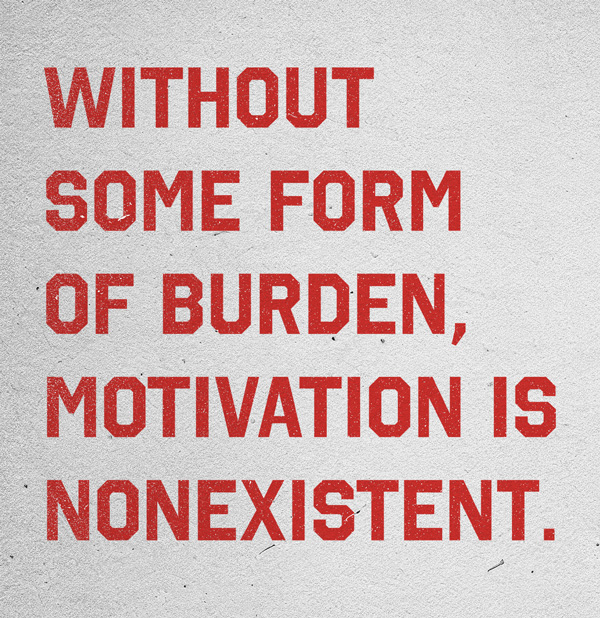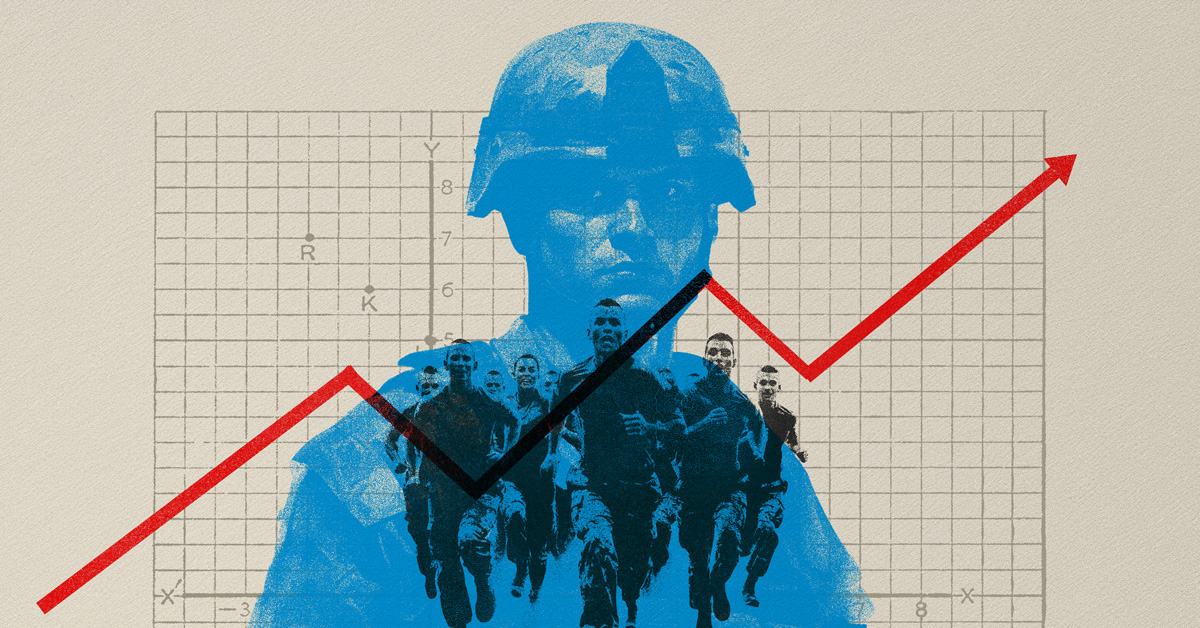Brad is a university lecturer with a master’s degree in Kinesiology and is a Certified Strength and Conditioning Specialist (CSCS) with the National Strength and Conditioning Association (NSCA). He has competed as a drug-free bodybuilder, is a cancer survivor, and a 21 year veteran of the Air National Guard. Brad has been a Primer contributor since 2011.
Many think of motivation in a singular way. That is the act of getting up and doing the thing you want to do. The fire that is under you so you can successfully drive forward and accomplish your goals.
There seem to be as many techniques to foster motivation as there are pithy social media quotes, in-depth blog posts, and self-help books. For some, it can be conjured up through traditional means of incentivizing while for others it can be as personal as a fingerprint.

When I went through boot camp motivation wasn’t hard to come by. One couldn’t afford to not be a motivated individual in a large group working toward a common goal. Military training has motivation built in but requires your best efforts to be sustained and effective.
1. Narrow focus
When we showed up to boot camp we quickly were instructed to put away our personal belongings as we were issued uniforms, taken to the BX for personal hygiene items, and basically stripped away of any and all identifiable belongings.
Overnight our lives became incredibly simple. More challenging, but simple. We quickly adopted a singular focus on what we needed to do each minute of the day.
Get up, PT, shower, shave, eat, train, drill, classes, clean, and whatever else we needed to get done.
Basic training was an extreme exercise in simplified focus. It did, however, provide a hidden perk. It made being motivated much easier. We didn’t have worldly distractions to derail us. We didn’t have the luxury of putting things off, getting sucked into a show, or having technology entertain us. We were feverishly engaged in the tasks at hand.
Apply it
The modern world isn’t short on distraction. In fact, boredom is now referred to as a net negative. Since we have supercomputers in our pockets now, we can easily stave off boredom and become blissfully distracted at all times. Unfortunately, this habit has seeped into our work and personal lives as well. We are losing our ability to focus on one task for more than a few minutes.
Now with many people owning multiple devices: phones, tablets, laptops, streaming services, podcasts, social media sites, etc., we are becoming a more distracted society by the minute.
The motivation to do something great has no room to flourish. Simplify. Make it a priority to set aside time for scrolling, stick to an organized schedule, leave your phone on silent, block time-wasting apps, and grapple back your attention–it’s yours after all.
Get focus back into your life and you will naturally cultivate more motivation to do the things that take priority and are important.
2. The pressure of teamwork
Normally, people will think of motivation from an individual perspective–internal, personal, and self-driving. But boot camp places you in a very unique environment. Yes, you are an individual and have personal responsibilities and tasks to complete, but you’re ultimately a part of a bigger mission.
Not only do you have a unified goal to achieve you also must perform your assignments as an integral part of a larger group. You have others that rely on you–that look to you to do your part. This, in turn, results in a synergistic energy that cultivates motivation. It is a kind of pressure to hold up your end. To do your job and do it well.
There becomes an unwritten but well-known rule that you must perform at a certain level because everyone else is. It’s a healthy, motivating pressure to do your best because others are relying on you.

Apply it
You don’t need to be in the military to subject yourself to motivational teamwork. One of the most important aspects of doing good work is placing yourself in the right kind of atmosphere. One that promotes a certain level of performance and lends itself to that healthy form of pressure to do your very best work.
Being a part of any team should demand that you become an important member who possesses unique skills and abilities that ultimately contribute to the team’s success. You cross the finish line together. In this age of individualism and self-promotion, it’s tougher to come by people who want to surrender themselves to the betterment of the team, but if you put away the ego and think of the common goal for the group, you’ll find that motivation is easier to achieve. Be a team player, offer up your unique skills, and allow yourself to be pushed by that mutual environment.
3. Extreme ownership
It may seem a bit hypocritical to list extreme ownership as a tool for motivation just after we mentioned teamwork, but there is a strong connection. Without the individual effort of doing a good job, the team will suffer as a result.
In boot camp yes, you are a part of the bigger picture, but you still have the burden of owning up to your individual responsibilities that ultimately benefit the group. I say burden with an asterisk. Without some form of burden, motivation is nonexistent. Much like the pressure felt from the team environment, you will need to take personal ownership of your job.
And this goes for screwing up too. In the military, individuals will be called out for their lack of performance. That’s why it’s imperative to get used to the idea of taking full responsibility for your failures even when things out of your control contributed.

Apply it
This extreme type of ownership is as important in the civilian workforce. Take the time to learn your position in an organization, and always improve your skills so that you become an asset to the team. Work to become a unique piece to the puzzle but never lose sight of the bigger picture.
This even goes for owning up to failures. We live in a blaming society. Our instinct is to often try to find some outside influence that leads to our mess up. Whether it’s another person or some circumstance out of our control we find comfort in being void of blame. However, if you apply extreme ownership to those failures, more than likely you’ll become someone seen as a highly honest, mature, and responsible individual.
→ Read more: Extreme Ownership by Jocko Willink & Leif Babin
4. Healthy comparison

They say that comparison is the thief of joy, but when thrown into a barracks full of others who are striving for the same things you will naturally tend to compare your work to theirs. Whether it was making the perfect hospital corners on our racks, folding our T-shirts into perfect six-inch squares, being the most accurate during marksman training, or trying to finish the timed run ahead of the pack, there can be such a thing as a healthy comparison.
You can also call this competition, but let’s face it, we are always comparing our work to others. Being around others and personally experiencing how your peers are performing can go a long way when you need motivation.
Apply it
When you use comparison in a healthy way with the sole intent of improving your own skill and abilities then it can become a welcomed ally. This is especially true when you’re a young start-up and take on an apprentice role. Looking at the more skilled and seasoned workers around you and seeing how things are done, processes are carried out, and expectations to uphold is like going to class on your feet. You can’t beat the instant and personal lessons of being around others and experiencing how things work firsthand. Of course, you’ll eventually blaze your own trail, but in the beginning, let comparison motivate you to grow and get better.
The words “competition” and “comparison” have different linguistic roots, but they share some common elements in their etymology.
- “Competition” comes from the Latin word “competere,” which is a combination of “com” (together) and “petere” (to seek or strive). So, “competition” essentially means people or entities coming together to seek or strive for a common goal, often involving rivalry or contest.
- “Comparison” also has Latin origins, derived from the word “comparare,” which is a combination of “com” (together) and “parare” (to make ready or prepare). In this case, “comparison” refers to the act of putting things together in order to make them ready for assessment or evaluation, typically to identify similarities or differences.
5. Pride
One of the best motivators around is having a sense of pride in your work. Boot camp had pride built into it. The feeling of committing to the military and your country, the history and lineage that you have the honor of carrying on, and the honest hard work you have the opportunity to exercise are ever-present.
One example in particular had to do with our drill instructors. At first, our instructors were people you wanted to avoid at all costs. You never wanted to draw special attention to yourself. In particular, I turned 18 in boot camp. I didn’t tell a soul. However, near the end, everyone was proud of their time with the instructors. We had the utmost respect for them and would do anything for them. Our pride fostered motivation.
Apply it
Take pride in all that you do. There’s a saying that you should do your best work even when no one is looking. Have pride in your work, in your relationships, in your home life, and in how you care for yourself and others.
Pride will lead to higher expectations you’ll have for yourself. It will compound over time into increased work quality, deeper relationships, and improved self-worth.
In turn, you will naturally become more motivated to uphold your new standard and it will rub off on others. Your motivation will become second nature.
One of the common threads throughout all the points above is that motivation doesn’t have to be something you work towards alone. Look around. Surround yourself with others who are as motivated as you want to be, take ownership of the good and bad that happen, learn from others, reduce distractions, and take pride in all you do. Over time your motivation will skyrocket without any self-help guru hack.















![It’s Time to Begin Again: 3 Uncomfortable Frameworks That Will Make Your New Year More Meaningful [Audio Essay + Article]](https://www.primermagazine.com/wp-content/uploads/2025/01/begin_again_feature.jpg)
